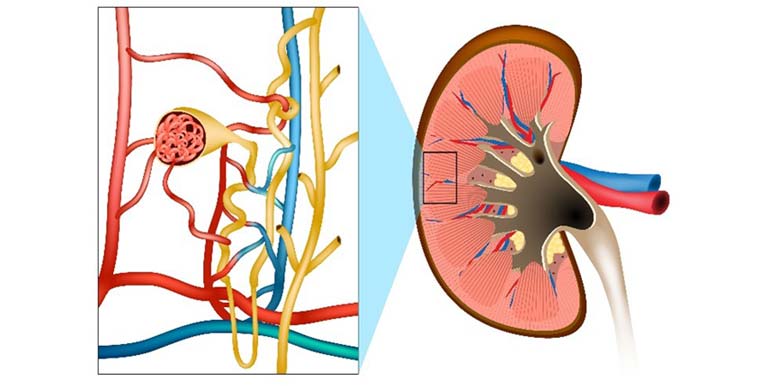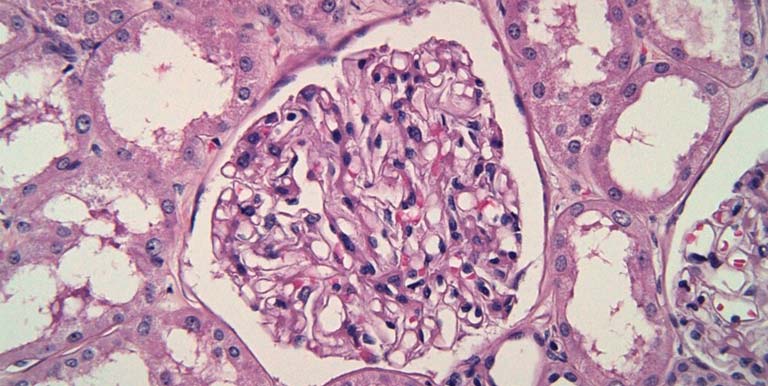Glomerulonephritis is a group of kidney disorders that hold profound implications for health. These disorders involve inflammation of the glomeruli – tiny filters within the kidneys responsible for cleansing the blood. This blog aims to shed light on the intricate web of causes, symptoms, and methods used to diagnose glomerulonephritis.
Causes of Glomerulonephritis
Glomerulonephritis has multifaceted origins, with immune-mediated factors playing a prominent role. Occasionally, the body’s immune system malfunctions, erroneously directing its assault towards the glomeruli. Conditions such as lupus and vasculitis, which are autoimmune diseases, can trigger these responses, ultimately resulting in glomerulonephritis.
Infections, too, play a role. Bacterial or viral infections can trigger an immune response that inadvertently harms the glomeruli. Hepatitis B and C, streptococcal infections, and even HIV have been implicated in causing glomerulonephritis.
Genetic predispositions underline certain cases. A family history of kidney disorders can increase the risk of developing glomerulonephritis. Additionally, certain genetic mutations can make an individual more susceptible to these conditions.
Drug reactions, exposure to certain toxins, and even diseases affecting blood vessels can contribute to the development of glomerulonephritis. Understanding these causes not only informs medical practitioners but also empowers individuals to take proactive steps toward prevention.
Symptoms
The symptoms of glomerulonephritis often manifest subtly, which can make early detection challenging. However, being vigilant about these signs can make a substantial difference in managing the condition.
- Proteinuria, or excess protein in the urine, is a hallmark of glomerulonephritis. The damaged glomeruli struggle to retain essential proteins, allowing them to leak into the urine. This can lead to foamy or frothy urine.
- Edema, characterized by swelling, is another common symptom. Fluid retention occurs due to the kidneys’ reduced ability to regulate sodium and water balance.
- Hematuria, the presence of blood in urine, can be a startling indicator. The inflammation and damage to the glomeruli can cause blood cells to leak into the urine, giving it a pink or cola-colored appearance.
- Hypertension (high blood pressure) often accompanies glomerulonephritis. The impaired filtration function of the glomeruli can disrupt the body’s fluid and electrolyte balance, contributing to elevated blood pressure levels.
Fatigue, nausea, and shortness of breath might also surface due to the accumulation of waste products in the blood as the kidneys struggle to function optimally.
These symptoms might not always directly point to glomerulonephritis, but they warrant medical attention, especially when they occur together.

Diagnosis
Timely and accurate diagnosis of glomerulonephritis is pivotal for effective management. Physicians employ a varied approach to confirm the condition and determine its underlying cause.
- Physical Examination: A physician may begin with a thorough physical examination, checking for signs of fluid retention, elevated blood pressure, and other indications of kidney dysfunction.
- Urine Tests: Urinalysis is a crucial diagnostic tool. The presence of protein, blood cells, or casts (abnormal structures formed in the kidney tubules) in the urine can provide valuable insights into the type and severity of glomerulonephritis.
- Blood Tests: Blood tests help assess kidney function by measuring levels of creatinine and blood urea nitrogen (BUN). Elevated levels might indicate compromised kidney function.
- Imaging Studies: Imaging techniques like ultrasound or CT scans can provide visual information about the kidneys’ size, structure, and potential abnormalities.
- Kidney Biopsy: In many cases, a kidney biopsy is the definitive step for diagnosis. A small tissue sample is taken from the kidney and inspected using a microscope. This allows doctors to determine the extent of inflammation, scarring, and the specific type of glomerulonephritis.

Southwest Kidney Institute (SKI) plays a pivotal role in the comprehensive care and support of individuals dealing with glomerulonephritis. With specialized expertise and patient-centered approach, SKI offers a range of services that contribute to better understanding, effective management, and improved quality of life for those affected by this kidney disorder.
- Expert Nephrologists and Care Team: Southwest Kidney Institute has a team of experienced nephrologists and healthcare professionals who specialize in kidney disorders, including glomerulonephritis. A deep understanding of the condition allows SKI to provide accurate diagnoses, tailor treatment plans, and offer personalized guidance based on each patient’s unique situation.
- Advanced Diagnostic Capabilities: The practice is equipped with state-of-the-art diagnostic tools that enable precise assessments of glomerulonephritis. These advanced techniques help in identifying the specific type, severity, and progression of the disorder, which is essential for effective treatment planning.
- Customized Treatment Plans: SKI recognizes that glomerulonephritis presents differently in each individual. Therefore, the approach to treatment is highly personalized, taking into account factors such as the patient’s medical history, the underlying cause of the disorder, and the extent of kidney damage. This customized approach guarantees that patients get the interventions that best suit their individual requirements.
- Patient Education and Empowerment: Understanding one’s condition is crucial for effective management. SKI places great emphasis on patient education, ensuring that individuals have a clear understanding of glomerulonephritis, its causes, symptoms, and treatment options. This enables patients to take an active role in their own healthcare and make well-informed choices regarding their well-being.
- State-of-the-Art Treatment Modalities: The practice stays at the forefront of medical advancements, allowing patients to benefit from cutting-edge treatment modalities. These may include the latest medications, innovative therapies, and minimally invasive procedures that can help manage glomerulonephritis more effectively.
- Collaboration and Multidisciplinary Care: SKI promotes a collaborative approach to patient care. Their team of nephrologists, along with other healthcare professionals, work together to ensure that all aspects of the patient’s health are addressed. This might involve collaborating with specialists from other fields to manage any complications or underlying conditions.
Through SKI’s expertise, advanced diagnostic capabilities, personalized treatment approaches, and patient education, they play a vital role in enhancing the lives of those affected by this complex kidney disorder.

